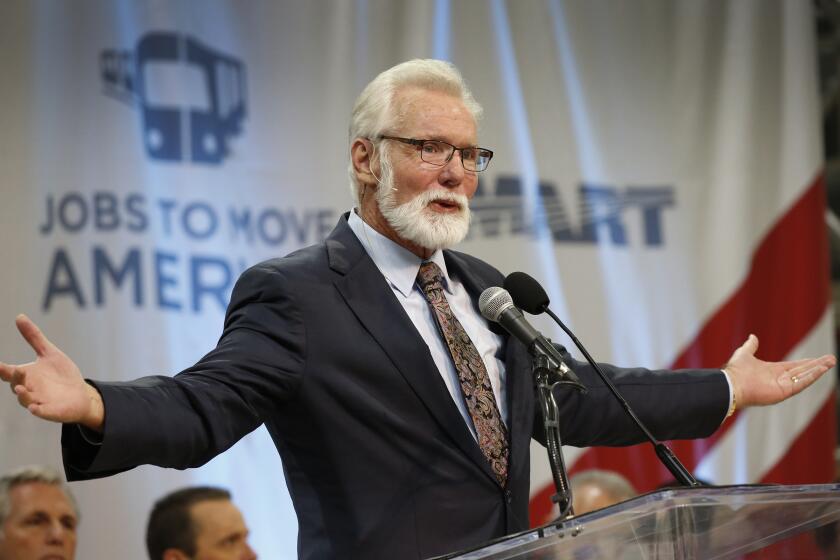Proposed bill would shorten California workweek to 32 hours. Here’s what you need to know

- Share via
A proposed bill winding its way through the state Legislature could make California the first state in the nation to reduce its workweek to four days for a large swath of workers.
The bill, AB 2932, would change the definition of a workweek from 40 hours to 32 hours for companies with more than 500 employees. A full workday would remain at eight hours, and employers would be required to provide overtime pay for employees working longer than four full days.
The bill was authored by Assembly Members Cristina Garcia (D-Bell Gardens) and Evan Low (D-San Jose). At the federal level, a bill by Rep. Mark Takano (D-Riverside) is pushing for similar changes under the Fair Labor Standards Act.
Reached by phone Friday, Garcia said the idea was prompted in part by the exodus of employees during the COVID-19 pandemic, many of whom were seeking a better quality of life. More than 47 million Americans voluntarily quit their jobs in 2021, according to the U.S. Bureau of Labor Statistics.
“We’ve had a five-day workweek since the Industrial Revolution,” Garcia said, “but we’ve had a lot of progress in society, and we’ve had a lot of advancements. I think the pandemic right now allows us the opportunity to rethink things, to reimagine things.”
This is the moment to reimagine work and, hopefully, break the American obsession with overwork.
Garcia and other proponents say a four-day workweek would lead to an increase in productivity and profits, and point to case studies already underway in Iceland and at companies such as Kickstarter. (The Times’ editorial board in September argued that the concept was worth a try.)
Opponents say a four-day workweek would stunt job growth in the state and could create untenable conditions for employers. The California Chamber of Commerce included the bill on its “job killer” list, writing that it would significantly increase labor costs, expose employers to litigation and impose requirements that are “impossible to comply with.”
Here’s what you need to know about this potentially monumental change:
Who would be covered by AB 2932?
The bill as written would apply to employers in California with at least 500 employees. According to the state’s Employment Development Department, that’s about 2,600 businesses and more than 3.6 million employees.
Unionized workforces, or those with collective bargaining agreements, are exempt, Garcia said.
How would it work?
The bill seeks to amend Section 510 of the California Labor Code by redefining the workweek from 40 hours to 32, with eight-hour workdays remaining in place.
Under the bill, employees who work in excess of 32 hours would be compensated at a rate of at least 1.5 times their regular rate of pay, as is currently required for those who work in excess of 40 hours.
Crucially, the bill would also prohibit employers from reducing an employee’s regular rate of pay as a result of the reduced hourly workweek requirement.
Garcia said conversations are ongoing about how the rules would work for salaried employees. She said the bill does not apply to workers with collective bargaining agreements because “I like to think of this as a floor, and oftentimes our bargaining agreements are better.”
But, she added, “we have to start the discussion someplace.”
What are the potential benefits?
Iceland ran two large-scale trials of the concept between 2015 and 2019, in which about 1% of the nation’s workforce reduced their workweek to 35 or 36 hours with no reduction in pay.
The nation found that productivity and service remained the same across the majority of trial workplaces, and worker well-being increased dramatically across a range of indicators, including perceived stress and burnout and health and work-life balance.
As a result of the trials, at least 86% of the country’s workforce are now working shorter hours or gaining the right to shorten their hours.
“The fact of the matter is many other companies are already doing this, and other countries too, so I think this is the direction we’re going,” said Low, the bill’s co-author, noting that many companies that have tried similar strategies have also reported better customer engagement and lower utility costs.
“This is going to attract more [employees] to your company, because it’s undisputed workers are looking for more flexibility,” he said.
What are the potential disadvantages?
Ashley Hoffman, a policy advocate at the California Chamber of Commerce, said additional labor costs imposed by the bill would amount to a minimum 10% increase in wages per employee per week, among other concerns.
“This significant rise in labor costs will not be sustainable for many businesses,” she wrote in opposition to the bill, noting that labor costs are often one of the highest costs a business faces, and that many companies operate on very thin profit margins.
“Such a large increase in labor costs will reduce businesses’ ability to hire or create new positions and will therefore limit job growth in California,” Hoffman said. “This is especially true now as businesses are still recovering from the impacts of COVID-19 and resulting rises in supply chain costs.”
Hoffman also said the bill could have the unintended consequence of a reduction in hours for workers.
What happens next?
AB 2932 is currently with the Labor and Employment Committee for review.
“Now we have an opportunity for business and labor and workers to have an honest and frank conversation about what this looks like, and then we’ll make changes accordingly,” Low said, adding that the bill was a “work in progress.”
A hearing date has not yet been set, he said.
More to Read
Sign up for Essential California
The most important California stories and recommendations in your inbox every morning.
You may occasionally receive promotional content from the Los Angeles Times.












